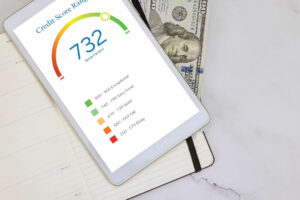Having a low credit score can feel like a major burden. But a “bad” credit score is not a life sentence. Here are some steps you can take to improve your credit.
Key takeaways
- Check your credit history for errors.
- Pay your bills on time and keep credit card spending low.
- Keep your credit utilization low and avoid closing unused credit cards.
- Pay off any debts you can and avoid hard credit inquiries.
Check your credit history for errors
First, you should check your credit history for any errors that you can dispute. Checking your own credit is known as a “soft inquiry” and does not affect the score. You can quickly check your credit history through sites like Experian, Equifax, and TransUnion.
You also have the legal right to obtain one free credit report every year. You can visit www.AnnualCreditReport.com to check your credit report for errors.
Keep in mind, if you’re already in the process of getting approved for a loan, and you notice an error on your credit report, you need to speak to your lender before disputing any mistakes. Making disputes during the loan application process can cause issues or delays with your approval.

Pay your bills on time
This means car payments, student loans, credit card payments, rent, utilities, phone bills, and so on. Consider setting these bills to auto-pay, or putting reminders on your calendar so you don’t miss payment due dates.
As a side note for your monthly bills, confirm if you are on auto-pay or not (especially for utility bills!). Sometimes, you may pay a utility bill in advance, just to be charged a second time on the auto-pay date. If this occurs, the double charge is usually credited to your utility account, so you don’t lose the money, but it’s definitely frustrating to be automatically charged for a bill you already paid!
Keep your credit card spending low
A good rule of thumb is to stay under 10% of your available balance. So if one of your credit card accounts gives you a monthly available credit balance of $1000, you should try to only charge $100 to that card each month before paying off the full balance from your checking.
One way to use credit cards to your advantage is to only use your credit card for fixed expenses like gas or groceries. If you use your credit card for more variable expenses like online shopping, this can rack up credit card debt faster than you think. Use your credit card on things you NEED to buy, not impulsive purchases that you want.
By using your credit cards wisely, you can build up your credit without taking on excessive debt.
Keep your credit utilization low
Credit card spending isn’t the only thing to keep in mind. Another major factor is your credit utilization ratio. This ratio looks at your credit usage across ALL of your credit accounts. Your credit utilization ratio is the amount of credit you currently owe divided by your total credit limit.
Let’s say you have two credit cards with a combined 100$ in debt, but your total credit limit for those two cards is only $200. This makes your credit utilization ratio 50%. Someone with the same credit card debt of $100 but a credit limit of $1,000 has a credit utilization of 10%.
You want to keep your credit utilization ratio low, preferably at 30% or less.
Do not close any unused credit cards
If you have any unused credit cards that aren’t costing you money in annual fees, keep these accounts open, as they can add to your credit history and boost your score.
If you close out an unused credit card, this lowers your total available credit balance, which raises your credit utilization ratio.
Even if your debt stays the same, messing with your total credit limit can increase your credit utilization, which will lower your score.
Pay off any debts you can
Many people think that paying off debt raises your credit score, which is only partially true. Yes, paying off credit card debt can help raise your score. However, when it comes to installment debt (for example, a car loan), paying those types of debts off early won’t raise your score.
Still, reducing your debt will improve your debt-to-income ratio (DTI). When getting approved for a loan, lenders will take your DTI into consideration.
The DTI is calculated by looking at your gross monthly income and your monthly debt payments. For example, if one-fourth of your monthly income goes toward paying off debts, then your DTI is 25%. By reducing monthly debt payments, can lower your DTI. The lower your DTI, the better your chances of getting approved for a loan.
However, if you are already in the process of applying for a loan, talk to your lender before paying off the debt. Don’t go paying off debts or collections during the application process, as this can cause issues with your approval.
Avoid hard credit inquiries
Don’t open any new credit cards or lines of credit, as these can cause hard inquiries on your credit score. These inquiries can stay on your credit history for two years. Keep in mind, the lower your credit score, the worse a hard inquiry can harm your credit.












